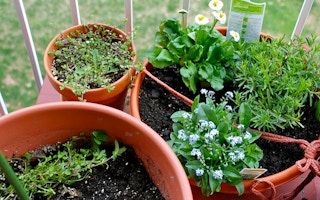With over 90 per cent of the food we consume imported, it is no secret that Singapore struggles to feed itself, relying on food producers from over 160 countries to keep our stomachs full.
To continue reading, subscribe to Eco‑Business.
There's something for everyone. We offer a range of subscription plans.
- Access our stories and receive our Insights Weekly newsletter with the free EB Member plan.
- Unlock unlimited access to our content and archive with EB Circle.
- Publish your content with EB Premium.
The challenges this situation poses are well known, with Singapore uniquely vulnerable to food shortages, price fluctuations, and a reliance on overseas food producers among other problems.
While diversifying our food sources helps alleviate some of these issues, it also creates an unsustainable reliance on ships, planes and other carbon-emitting, expensive transportation methods.
The Agri-food & Veterinary Authority of Singapore (AVA) has promised to raise Singapore’s self-sufficiency levels for eggs, fish and leafy vegetables to 30, 15 and 10 per cent respectively. While technology may play a part in this, perhaps the better solution lies closer to home.
In Singapore, there are large-scale organic farming projects that adhere closely to the principles of permaculture. It is also possible for individuals to grow their own vegetable produce at home in an urban apartment setting, such as in front/back yards, apartment balconies, and even rooftops.
Specific to apartment balconies, a variety of produce can be cultivated despite the relatively small space. When we look at balconies, the main consideration is space and hence the best medium to grow a variety of produce would then be pots.
Here in Singapore, there are certain vegetables that take well to being potted and which are commonly eaten in households.
1. Lady’s finger (okra)
This member of the hibiscus family is typically grown for their pods (which are used a lot in Southeast Asian cuisine) and they happen to have beautiful edible flowers as well. If your balcony receives a lot of sun, this plant will typically thrive and yield great results.
2. Brinjal (eggplant)
While a variety of pots are employed in growing vegetables at home, a clay pot is recommended for brinjal as clay absorbs and retains heat better. This boosts the growth process significantly. Remember to clean and disinfect the pot before planting. Leaving it out in the sun for a day should be sufficient to ensure optimum sanitary standards.
3. Sweet potato leaves
Sweet potatoes are a hardy plant that are known to grow well even in poor soil. Hence, when grown in optimal conditions, this plant will flourish amazingly well. Ensure there is sufficient aeration in the soil and water, and Singapore’s hot tropical weather will do the rest.
“
With over 90 per cent of the food we consume imported, it is no secret that Singapore struggles to feed itself, relying on food producers from over 160 countries to keep our stomachs full.
4. Spring onions
Spring onions are a perennial vegetable that hails from the onion family. Even among spring onions, there are many different types, so do check that you are growing the kind that you prefer before committing the seeds to soil. As with the other vegetables featured so far, they thrive well in hot conditions. The great thing about spring onions is that when mature, you can actually harvest the seeds from the plant to prepare for the next batch.
5. Kai lan (Chinese kale)
The last vegetable on the list is pretty much ubiquitous if you hail from Southeast Asia. This plant grows well in warm temperatures and can be harvested multiple times. Leave the main stalk in the pot and harvest the leaves when fully grown. The leaves will grow back quickly and you will have a fresh supply of kai lan ready for your next meal in no time.
Growing your own food in Singapore is not difficult, and all it requires is a little of time and effort at the beginning to get the process started. Once that happens it boils down to careful monitoring and observation. This really is just a part of the larger conversation of conservation and living sustainable lives that will improve and care for the environment in which we live in.
Debbie is a permaculture consultant and designer trained by world-renowned permaculture consultant, designer and teacher, Geoff Lawton of Permaculture Research Institute of Australia. She is Co-create Nature’s primary educator and consultant.










